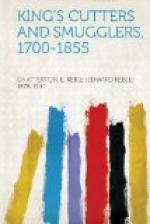We mentioned just now that the danger to the State of this import smuggling was not merely that goods were brought into the country without payment being made to the Customs, but that inasmuch as the contraband goods were purchased abroad partly by wool and partly by actual coin England was being robbed both ways. And as the wool exportation declined and the import smuggling rose, so the amount of gold that passed out of the country seriously increased. At least L1,000,000 sterling were carried out of the kingdom each year to purchase these goods, and of this amount somewhere about L800,000 were paid for tea alone. At a later date the price of tea often went up, but the dealer still made a profit of 40s. on every 100 lbs. We alluded just now also to the dangers of seizure, and it is worth remarking that these were recognised by the smugglers as being greater in one district than in another. For instance, it was much more difficult to run goods into the counties of Kent and Sussex than into Suffolk, owing to the fleet at sea and the troops on the coast. And as to the amount of support which could be relied on it was an admitted fact that there was not one person in ten in the country but would give the smugglers assistance, and even lend them horses and carts. For the use of these the smugglers made payment at an increased rate.
There was one witness before this Commission who stated that he knew of about sixty English cutters of from thirty to forty tons burthen each, and five or six vessels of the same burthen belonging to merchants at Flushing which were employed constantly in running goods across to England, and several of those who gave evidence confessed that they had for years been actively engaged in smuggling, but had taken advantage of the late Act of Indemnity. One reason alleged for smuggling tea was that the East India Company did not sufficiently supply the dealers with the low-priced kinds, whereas the Dutch did. And it was further contended that if the price of tea were lessened sixpence per lb. it would put a stop to smuggling of the commodity, for at this date, although other articles such as spirits and tobacco were brought in, yet there was far more tea run than anything else. But at the same time the smugglers rather liked to include a quantity of brandy casks among their cargo for the reason that they were heavy and made very good ballast. And as to the ships themselves, it was agreed that those of the smugglers were the best sailing fore-and-afters that were built in those days, and could easily out-sail both the King’s ships and the Custom House sloops. Finally, it was shown that in spite of the large and tempting rewards that were offered by advertisement for the apprehension of those persons who had been concerned in smuggling, no one had come forward to give information for the reason that, even if he would, he dared not. And so fascinating was the call of smuggling, that although there were those who had willingly embraced the pardon granted them by the recent Act, forsaken this illegal trade and settled down on farms or devoted themselves to other occupations which were within the law, yet there were many others who had returned to their former practices.




